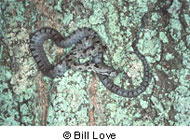Description:
Baird's rat snake is closely related to the common rat snake. Members of the rat snake clan can have stripes, blotches, or a combination of stripes and blotches; even unicolored species can be found. Ventral patterns of Baird's rat snakes usually consist of light and dark areas; the overall coloration of the ventral scales is an attractive orange-yellow. Rat snakes also have several representatives that are amelanistic (lacking black pigment) or leucistic (white coloration with blue eyes). Housing for the rat snake group can be simple. Cages should be escape-proof, roomy and well-ventilated. Hide boxes are appreciated by most forms. Substrates that work well include pine shavings, newsprint, indoor/outdoor carpeting or paper toweling. These animals do best with ventral heating–provide a heater on the bottom of one side of the cage setting up a temperature range from which the animal can select its preferred body temperature. These snakes can be maintained on adult mice or, as their name implies, rats.
Habitat:
Rocky wooded areas and upland deserts.
Range:
Inhabits the western region of Texas, south into Mexico.
Scientific Name: Pantherophis (Elaphe) bairdi
Species Group: rat-snake
Family: Colubridae
Size: 3 to 4 feet
Level: beginner
Weight:
Dangerous: No



